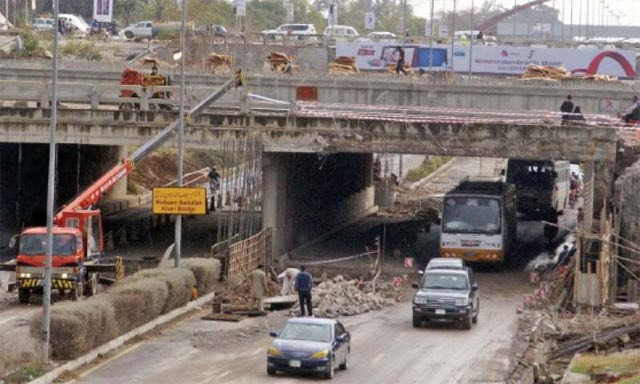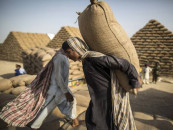'Road infrastructure key to growth'
City planners stress need for road rehabilitation, ensuring urban development

National and international architects and city planners have said that constructing and maintaining road infrastructure is key to economic development, and the government must prioritise it for sustainable and rapid economic growth. They pointed out the need to address climate issues caused by deteriorating roads and traffic congestion in Karachi, where many major thoroughfares have fallen into disrepair due to a collapsed sewerage system.
They shared these views during the concluding session of the two-day programme titled "2nd Conference on Architecture, Architectural Encounters: Neo-Liberalism & Localness – Conflicts & Solutions," organised by the Department of Architecture & Planning (DAP) at NED University of Engineering & Technology, Karachi City Campus, on Saturday.
Eminent city planner and NED University Dean of the Faculty of Architecture and Management Science, Prof Dr Noman Ahmed, said that mapping out sewage flows is essential, as many recent projects have miscalculated these flow processes. He pointed out that the topography of several neighbourhoods in Karachi has changed, affecting sewage outflows. To address this, he suggested realigning the existing sewerage network and developing a strategy for local sewage treatment, as treated sewage can be utilised for horticulture, city greenbelts, and other purposes.
Karachi requires a comprehensive road revamping and rehabilitation plan, along with proper budget allocations, as its 9,500-kilometer road network falls under the jurisdiction of various civic departments and agencies.
He also stressed that city planners and designers must consider topographical variations when planning sewerage systems and water supply lines, as sewage flows naturally from north to south, reducing the need for costly pumping stations. Local issues must be resolved at the local level by strengthening municipal departments to ensure urban services and address technical challenges based on assessments from respective constituencies.
Dr Omniya Abdel Barr, Head of Development at the Egyptian Heritage Rescue Foundation in Cairo, highlighted the challenges of preserving historic quarters in Cairo. She highlighted the delicate balance between architectural restoration and community development. Her work underscored the importance of participatory approaches, involving local residents in the planning and implementation of revitalisation projects. She also noted that reviving traditional crafts can play a crucial role in economic development and cultural preservation.
NED University DAP Chairperson, Prof Dr Anila Naeem, said, "The political system is affecting the way the city is being managed. Prioritising and implementing road infrastructure is always the prime responsibility of the government or the state. Until the government has a system to deliver, it does not work. Unfortunately, there is no priority to serve the public in the country."
She noted that while funds are allocated for road construction, users often do not benefit due to poor project implementation and a lack of accountability. "There must be a system of implementation, monitoring, and accountability," she added.
She further explained that encroachments arise in response to public needs, as they are part of the informal economy. Since the state fails to meet the requirements of local businesses, the informal economy grows. She suggested that fulfilling this demand through proper urban planning could eliminate encroachments. Instead of political intervention, she stressed the need for political will to address municipal issues and empower local government departments.
Leading architect and town planner Rabiya Asim, who is also a lecturer at DAP and the main coordinator of the conference, stated, "Through policy development, public-private partnerships can improve the overall road network and infrastructure to provide better facilities for all stakeholders. A well-structured policy framework and collaboration among stakeholders influence many aspects of the city. Road infrastructure is crucial for economic progress. The better the connectivity and accessibility, the stronger the economic conditions will be," she added.
NED University's Dr Saeeduddin Ahmad highlighted the impact of urban planning on vehicular traffic and air pollution. He stated that routes between workplaces and residential areas significantly contribute to congestion and pollution. Reducing unnecessary routes can enhance sustainability and minimise environmental damage, planners must consider before designing new roads.
He remarked, "Where there are better roads, there will be better businesses and markets. Once roads are built, roadside spaces should not be left vacant. Greenbelts or service roads should be incorporated, as empty spaces often get encroached upon."





















COMMENTS (1)
Comments are moderated and generally will be posted if they are on-topic and not abusive.
For more information, please see our Comments FAQ